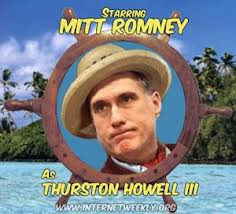Manifesto Joe Interviews A LibertarianQuestion: When natural disasters like hurricanes occur, doesn't this show the need for a reasonably strong federal government, strong in the right kinds of ways, to help those who have lost virtually everything?
Answer: A government that is big enough to give you everything you want is also powerful enough to take away everything you have.
Q: I'm talking about people who no longer have anything. It was the hurricane that took it all away. Their houses are gone. Their possessions have been swept away. To whom do they turn, if not government?
A: Themselves. This country was built by independent, resourceful, self-reliant people. The weak ones died off, and the strong survived. The pioneers weren't crybabies, whining for a handout, after locusts destroyed their crops. They tightened their belts and survived until the next crop came in.
Q: Historians say a lot of homesteaders had to go back East after catastrophes like that. And then, I doubt that they did well. We have no way of knowing how many starved or died of disease. Would a little disaster aid from a bigger federal government have been a bad thing then?
A: Those people knew the risks when they staked claims as homesteaders. Besides, remember that the land was given to them by the government. Just about anything government does, beyond the bare basics, turns out badly. And again, I'm just not concerned about weak people. Let them die off. Then, they're not a burden on taxpayers like me.
Q: This seems to have less to do with people being strong or weak as it does with people being lucky or unlucky, regarding hurricanes, locusts and such. What's your take on luck?
A: Luck has nothing to do with it. Successful people simply know how to work hard. They make their own luck.
Q: It's pretty challenging to work hard when you haven't eaten. If a swarm of locusts eats up your crops, and you have little to eat, doesn't this put you at a natural disadvantage versus someone who's "luckier"?
A: We obviously disagree about luck. Bad luck is a delusional excuse for failure. I don't know anybody who hasn't had some bad luck in their lives, but the strong work hard and overcome these obstacles. That's their natural advantage.
Q: So you're saying that some people are just naturally superior, and they deserve to survive and ultimately prosper because of natural selection? The social Darwinist thing?
A: Quite so. I have no time or money for the weak, or even the mediocre. Excellence should be the thing we cultivate. And that's best done in free markets.
Q: Back to the hurricane victims. There were a lot of swank subdivisions wiped out entirely by Ike. These were fancy homes before the storm. Aren't a lot of those folks the strong, successful ones you laud? And now back to luck. Wouldn't you say that theirs was pretty bad this time?
A: They don't need to whine about it, and I dare say many won't. They'll just rebuild.
Q: With government help?
A: In some cases, yes. But that's just people naturally taking advantage of opportunities. America is, after all, the land of opportunity.
Q: Hold the phone. You're saying it's OK for an upper-middle-class family, left homeless by a hurricane, to accept government help? Does that mean it's OK for the poor to accept it, too? According to your view, shouldn't they all be "self-reliant" and turn it down?
A: In a perfect world, that would be true. But you may have noticed that this world is far from perfect. In a perfect world, no government of any kind would be necessary.
Q: So you're admitting that government is at least a necessary evil?
A: Yes. And the best government is that which governs least. It limits itself to just taking care of the basics.
Q: Does that include disaster aid, for rich and poor alike?
A: If the aid is there -- in an imperfect world, it makes sense to take it.
Q: Did you go to college?
A: Yes.
Q: How did you pay for it?
A: I worked at part-time jobs.
Q: And that was all?
A: Well, there were student loans. I paid them all off. No thanks, of course, to the onerous tax burden from the federal government.
Q: These loans were available thanks to government programs. Legislation was passed, and funds were appropriated. This happened by design, not chance. If this hadn't happened, how would you have paid for college?
A: I would have found a way. The strong overcome obstacles.
Q: Like hurricanes?
A: Yes, to name only one kind.
Q: But you say very little good ever comes from government. Would you say that government lending you money for college resulted in something bad?
A: Even a blind sow finds an acorn now and then. There were a few people like me who took the loans and turned out well. Many just squandered the money. I saw it.
Q: I took the loans, plus grants and scholarships, paid the loans off, and haven't done badly, either. Looks like more than a few of us did well enough, paid the loans back, and got into a higher tax bracket so that we could help the next generation of less fortunate people like us. And we can also afford to help hurricane victims. But, back to education -- I've talked to young people who have told me that a lot of the college aid programs that our generation benefited from aren't there anymore. The programs were slashed again and again, and now there's not much money left. Shouldn't today's less advantaged young people have the same opportunity?
A: It's a hard world. Our generation was ...
Q: Lucky?
Manifesto Joe Is An Underground Writer Living In Texas.






















